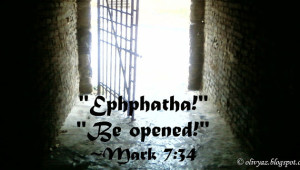 Jesus and his disciples enter a private home. Jesus asks his disciples about the argument they had while they were journeying. Their arguing about who is the greatest is on one level amusing. Jesus asks them, “What were you arguing about on the way?” And they are like children who don’t want to tell their parents what they’re talking about. Or adults, when there is dead silence when the principal or prioress enters the room. I think Mark is amused. Jesus doesn’t push for an answer. He won’t publically humiliated or embarrass them. Instead He calls forward a child.
Jesus and his disciples enter a private home. Jesus asks his disciples about the argument they had while they were journeying. Their arguing about who is the greatest is on one level amusing. Jesus asks them, “What were you arguing about on the way?” And they are like children who don’t want to tell their parents what they’re talking about. Or adults, when there is dead silence when the principal or prioress enters the room. I think Mark is amused. Jesus doesn’t push for an answer. He won’t publically humiliated or embarrass them. Instead He calls forward a child.
Jesus could have just told taught them his lesson. Why did He use a child? Well, remember in first-century Palestine, children were without status or power, possessing no legal rights. They were viewed as mere property and largely ignored by most adults. Secondly, Jesus used a child to teach about service because children really can’t do anything for adults. A child can’t make you more important in the eyes of the world. However, a child can teach you much about ministry!
Think about it, every parent (or older sibling) knows what happens when there’s a new baby in the house. That child demands everything! From day one it must be served, every need must be met by a willing adult. Children take constant care and attention. If they are ignored, they let you know all about in loud and irritating fashion. Children teach us what giving and service are all about. And the giving does not stop … often into adulthood.
Jesus used a child but notice that he does not say “receive this child.” Rather He says: Receive one such as this.” Children need to be served, but they cannot serve us in return. That is a lesson we all need to take to heart. Too often, we only serve those who can do something in return for us. Jesus would have us reach out to those who are the neediest. He would have us serve those who cannot, or will not, serve us in return. He directs us to do as He did and give our all for those who may break our hearts in return.
So, this leads to question: Who are the people without power or status in our society? Do we serve them willingly? Jesus teaches that God’s judgment of us will be based on this criterion alone.
We see this no better portrayed than in the upper room with Jesus’ washing the disciple’s feet even as he offers the new covenant meal, and later hanging on the cross, offering himself.
At the deepest level Jesus’ idea of service — humble servanthood — reminds us that none of this is about us! It’s not about our ego. It’s not about how much we give, how much we work, how many hours we minister, whose ministry is more important. It’s not about our wants and needs, or what we think others must do for us.
Service, instead, is about absorbing the sufferings of world by sharing our life — our time, our resources and our gifts. It’s building-up the other so that she in turn is built up to be Christ to others.
Jesus asked his disciples: “What were you arguing about on the road?” This is another key word: ‘road’. Every time we travel with Jesus they are “on the road”. Because Jesus himself is the Road: he is the Way, the Truth and the Life. We are being asked what we are doing while on the Way. The disciples refused to answer and kept silent. They were ashamed. It was not the kind of talk suited to people on the Way. They had been arguing about which of them was the greatest; who would become the leader of their group if Jesus’ prediction of death proved true? They could hardly say, “Well, since you are going to be killed in the near future, we were wondering which of us should take over.”
With a child in his arms, Jesus says, that to accept, to welcome persons such as this little one, is to welcome him. To be concerned about the wellbeing of another person, oblivious to the cost – putting the focus on the other rather than on what serves one’s own self. Benedict captures this sentiment in RB chapter 72, in quoting the Letter to the Romans:
Anticipate one another in honor, vie in paying obedience one to another – no one following what she considers useful for herself, but rather what benefits another…
What had caused the disciples to even begin thinking along the line of who Jesus’ successor would be? Could it have had something to do with the fact that Jesus had chosen only three of them, Peter, James and John to go with Him up the mountain? As they walk, they talked and the brewing question just sort of came up. The three had been elated when they came down the mountain. But, they had been admonished by Jesus not to talk about what they had seen or heard. The nine felt left out. When they were talking among themselves the issue seemed important. But, when they stood before Jesus, they suddenly saw how silly, immature, arrogant and self-centered they had been. He was talking about the matters of eternity. And, all they could do was fight about who should be first!
When this life is over and we are before God; all of our petty, silly striving to be first will be seen to be as childish. Would you rather stand before Him in embarrassment because you wanted to be first? Or, would you rather stand there and hear: “Well done, good and faithful servant: you have been faithful over a few things.. enter thou into the joy of you Father.” The choice is ours.
Mass Reflection by S. Roberta Bailey, OSB, Prioress
Continue Reading






